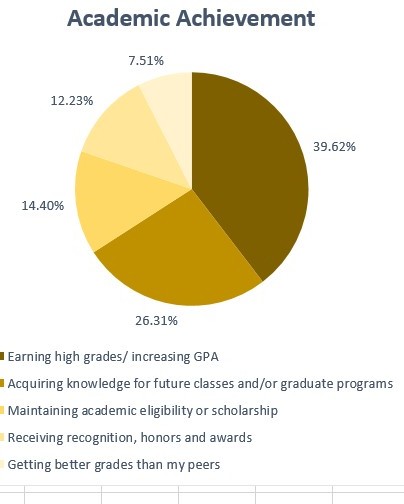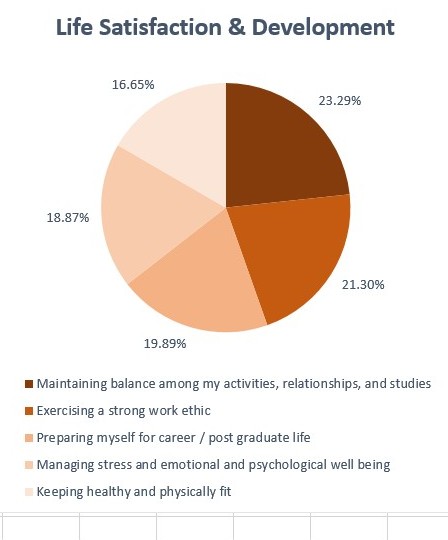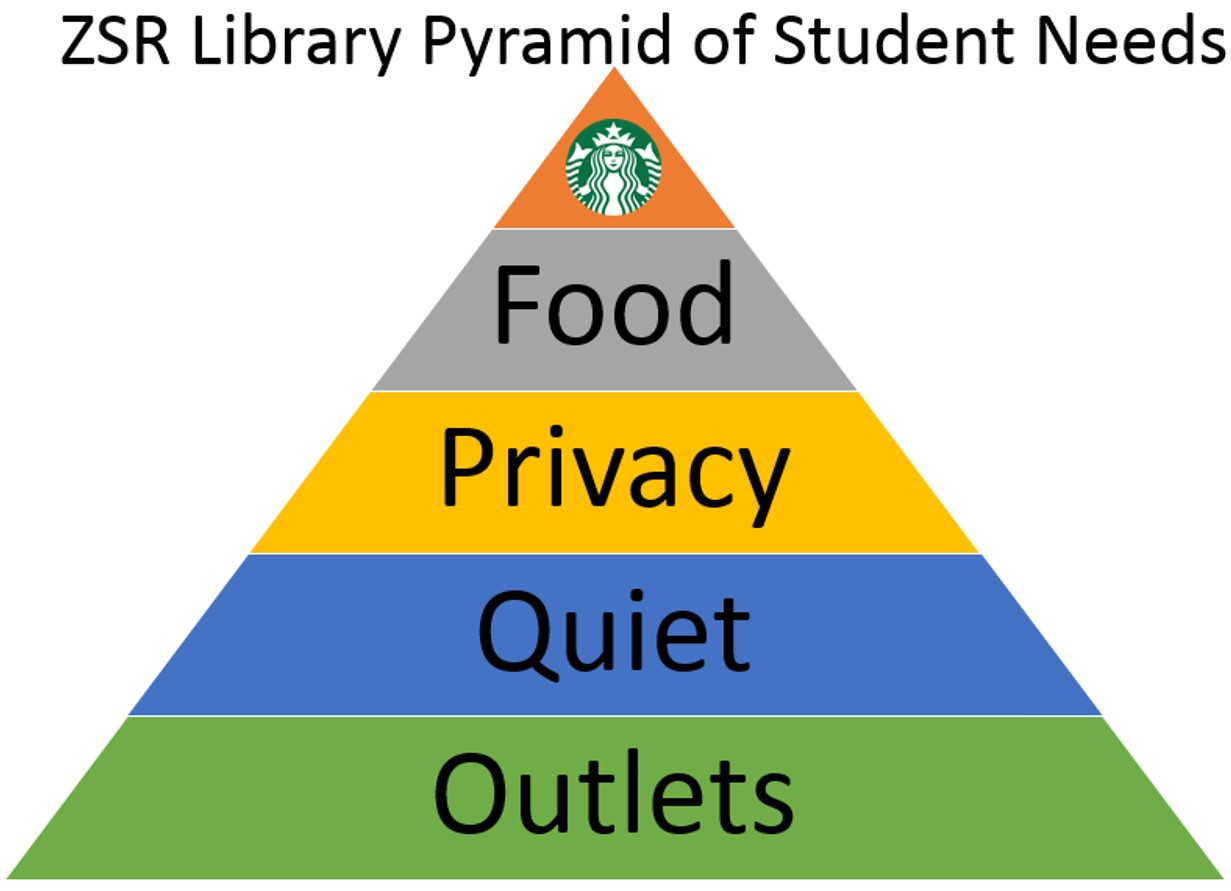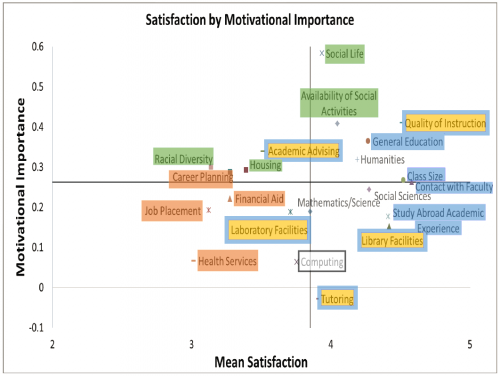Assessment in Action – Final Report
What’s in it for me? Success, motivation, and gaps
(or Electric youth: Student obsession with outlets) WFU IRB00021785
The Z. Smith Reynolds Library applied for and was granted an opportunity to participate in the Association of College and Research Libraries (ACRL) Assessment in Action (AiA) project. Through webinars, in person day-long conference sessions in 2014 and 2015, the creation of cohorts among team leaders, and development of communities of practice, the ACRL’s Assessment in Action was created to build capacity for investigation and assessment that will help demonstrate academic libraries’ value to their home institutions. Wake Forest University participated in the second year of this three year program alongside teams from 73 other institutions across the US and Canada.
Background
In the summer of 2014, Z. Smith Reynolds Library at Wake Forest University began a year long investigation to identify the success factors that were most important to students. The mission of the Z. Smith Reynolds Library is “to help students, faculty and staff succeed.” This mission serves as a moral compass and unified focus for library staff and faculty, encouraging us to remove barriers to library services and resources. In every interaction with patrons we realize, “It’s not about us, it’s about them”. But even as we identify this foundational principle of service, we have no measure that identifies if, in fact, we are successful in this effort. The Assessment in Action team of ZSR chose to focus on student success because it directly aligns with our mission. This inquiry identified what students recognize as success factors so we can better align our services with those factors. As we are about to embark on a library renovation, we will also use information gained from this investigation to inform future library program development and facility needs.
The Team
The Assessment in Action team included:
- Mary Beth Lock, (Chair), Director of Access Services, Z. Smith Reynolds Library
- Le’Ron Byrd, ZSR Library Fellow, Z. Smith Reynolds Library
- Glenda Boyles, User Tech Support Coordinator, Associate, Information Systems – Service Desk, The Bridge
- John Champlin, Manager, Recruitment and Organizational Development, with The Professional Development Center
- Ryan Shirey, Director, The Writing Center
- Meghan Webb, Reference Services Coordinator, Z. Smith Reynolds Library
The team composition included representation from the most utilized student facing services located in the library (Circulation, Reference, Writing Center and the Information Systems services desk known as ‘The Bridge’). Participation from these heavily utilized service areas was critical to help gain insight into all the library’s services and how students utilize and value them. Additionally, the library’s Fellow, a recent graduate of WFU, provided significant student perspective. The representative from the Professional Development Center was skilled in conducting focus groups and this experience was why he was asked to join the team. He also was adept at providing graphical charts to enable us to better conceptualize our qualitative heavy assessments.
Inquiry Question
Does student use of library resources, spaces and services correlate with greater self-efficacy in student defined measures of success?
Methodology
While we were deciding how to conduct this investigation, Meghan Webb brought an article to an early team meeting entitled “‘What Would Make This a Successful Year for You?’ How Students Define Success in College.” Published in the Association of American Colleges & Universities in 2013, the article described a survey that was conducted over 4 years with students at a group of Liberal Arts Colleges in New England (Bates, Bowdoin, Colby, Middlebury, Smith, Trinity, and Wellesley, ) from 2001 to 2005. The survey was conducted to identify students’ self-defined measures of success and how they changed over the 4 years they spent at their respective institutions. The sample size was small, (n=66) but their in-depth investigation identified markers in each of the four years.
The AiA team from ZSR developed a survey that utilized the same success measures provided in this article. We created our assessment tool in Qualtrics (TM) and set a goal of collecting responses from 350 students. The survey asked students to rank the importance of each success factor allowing then to identify which will be most important to their success in the coming year. The success factors fell into four categories: “Academic Achievement,” “Academic Engagement,” “Social and Residential Life,” and “Life Satisfaction and Development.”
We attempted to get students to take our survey by promoting it through several classes taught on campus including Lib 100 and Lib 2xx, (the Z. Smith Reynolds Library information literacy courses,) and in select writing classes. In addition, we surveyed students in person on campus, asking them to take the survey on an iPad. We encouraged them to take the survey when they were studying in and around the library, or across campus in other popular study spaces. As a team we surveyed entire tables of students as they were eating or socializing in eating establishments. We had the survey link available on table tents in the library, sent the link through our social media channels, and encouraged the students to give feedback during transactions that took place in The Bridge, at the Circulation and Reference Desks, and at the Writing Center. At the end of 3 months of seeking input, we finally closed the survey after having collected 273 completed surveys.
The second phase of data gathering began in February of 2015, using focus groups to gather feedback on the responses for each of the 4 success factors. We reached out to students who had said in the survey that they would be willing to participate in focus groups in the next phase of the project. We again had difficulty getting students to participate in these sessions, though we offered pizza as an enticement, and held them all during the dinner hour. Despite scheduling and promoting 3 one-hour long focus groups, we had opportunities to discuss success factors further with just 10 students.
Data Analysis
Preliminary analysis of our Qualtrics (TM) data indicated that when students are looking forward, describing success factors for the coming year, they place highest value on academic achievement. 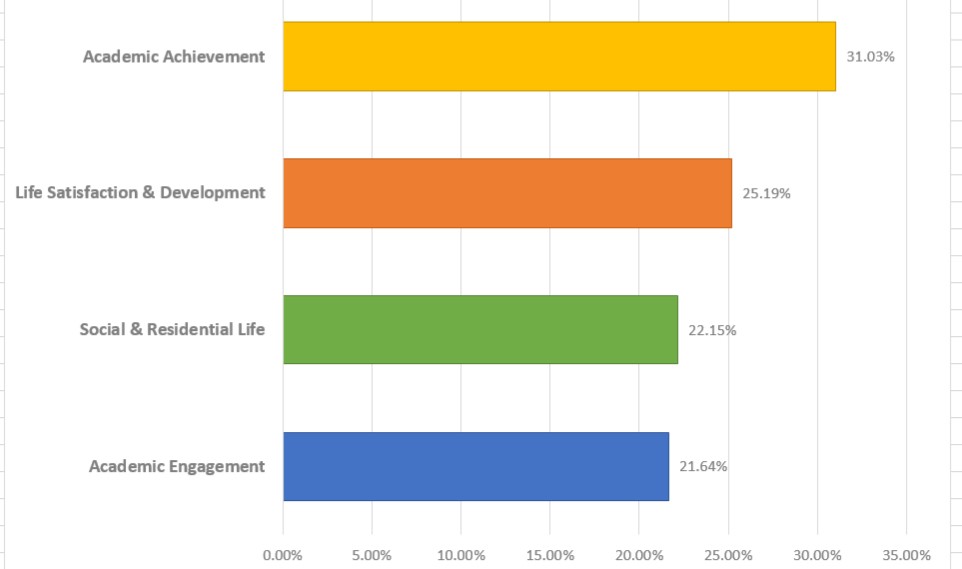
Each of these success factors are examined in turn, below in order of relative importance to the students as it was indicated on the survey. In a highly competitive and selective school like Wake Forest, having “Academic Achievement” top the list of success factors is not surprising.
The most prominent factor under “Academic Achievement” was for “earning high grades/increasing GPA” followed secondarily by “acquiring knowledge for future classes and/or graduate programs.” These two, which accounted for a third of the overall responses to this question were clearly advantaged over the other choices, “maintaining academic eligibility or scholarship”, “receiving recognition, honors or awards” or “getting better grades than my peers.”
Students indicated a clear desire for gaining that which will help propel them forward toward future, independently focused successes. Competition with other individuals and awards were less important than other factors.
Students identified “Life Satisfaction and Development” in identifying the next most important factor in measuring success in the coming year. In this category, however, there was no clear winner among the five options. “Maintaining balance among my activities, relationships, and studies” with 23.39% was most desired, but all of the 5 options fell within 3.5% of the 20% that is one fifth of the whole. “Keeping healthy and physically fit”is the least valued success factor.
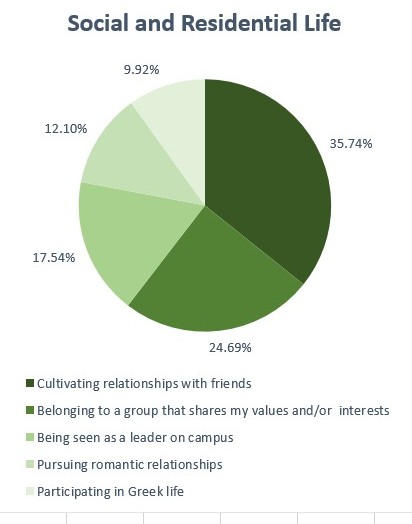 “Social and Residential Life” was third most important success factor to students participating in the survey. Students indicated that “Cultivating relationships with friends” and “Belonging to a group that shares my values and/or interests” were highest priorities to determine a successful year. Interestingly, “Participating in Greek Life” received the smallest support at less than 10%. From what the members of the committee know about the influence of Greek Life on this campus, the under-representation of this in our survey was surprising. While we did try to get an adequate cross sample of students both in and out of the library and all around campus, we did not go into residence halls or dorms to get students to participate in the survey. Perhaps all of the students who are most devoted to Greek life were in their study lounges where we could not venture.
“Social and Residential Life” was third most important success factor to students participating in the survey. Students indicated that “Cultivating relationships with friends” and “Belonging to a group that shares my values and/or interests” were highest priorities to determine a successful year. Interestingly, “Participating in Greek Life” received the smallest support at less than 10%. From what the members of the committee know about the influence of Greek Life on this campus, the under-representation of this in our survey was surprising. While we did try to get an adequate cross sample of students both in and out of the library and all around campus, we did not go into residence halls or dorms to get students to participate in the survey. Perhaps all of the students who are most devoted to Greek life were in their study lounges where we could not venture.
Least important to identifying a successful year for the students surveyed were the factors related to “Academic Engagement.” Of all of these options, “Building knowledge and character” ranked most important, and “cultivating a desire to learn” was second most important. The least important overall was “Exploring areas outside of my major concentration or interest.” This is a critical development when one considers that the exploration that takes place in academia is a core part of a Liberal Arts education. The students we surveyed maintain a clear focus on the end goal of graduating on time and with getting good grades at the expense of exploring non-core courses of study. Later, when we compared our data with that gathered from the Office of Institutional Research at Wake Forest, we found telling confirmation in the HERI (Higher Education Research Institute) Freshmen Survey of 2014 summary report (released in Spring of 2015.) It indicated that current First Year students at Wake Forest are less interested in studying abroad than in previous years. The AiA team has identified this trend at as another element that correlates to the evidence provided in this factor.
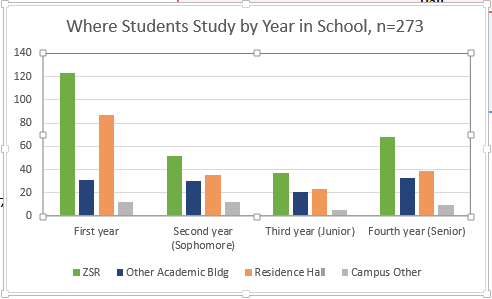
First year students tend to study and work collaboratively in ZSR as their primary location, and will choose Residence Halls for individual study. By sophomore and junior years, this difference is mitigated by their discovery of other, more convenient spots (meaning closer to their residence halls). By senior year, when most students are living in off campus housing, they again show a greater reliance on ZSR as their “home base” for studying on campus.
Additionally, the library is a favored place for First Generation College Students, whereas International Students prefer to study in their Residence Halls over all other locations on campus.
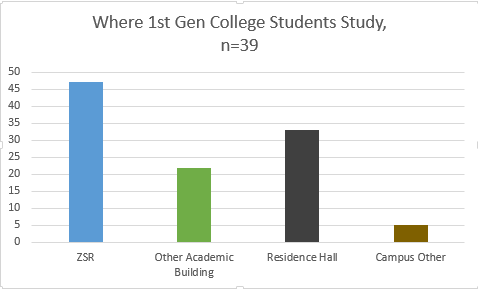
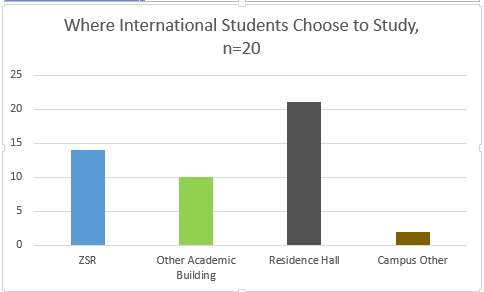
In our admittedly small but relevant focus groups, we found evidence that the students consider “the library” most frequently as a place, and less so as a collection of resources, services, or experts available to help them succeed. Our conversations with students around how the library can help them be more successful students lead to comments focused on the physical surroundings.
When asked about what they currently find valuable about ZSR, representative comments included: “no distractions,” “complete silence,” “not private enough,” “free food,” “really interesting exhibits. It’s kind of refreshing to see that in the library,” “big space that a lot of people share,” and “ZSR has become our Student Center.” Less frequently, comments such as “they’ve been helpful and nice, every time” and “they enable me to do more, myself,” indicated they valued the work we do, and were satisfied with our effort. When a focus group cohort was asked why it is so hard for us to get students to participate in these small group conversations, students said that an hour was just too difficult to devote to a focus group on the library. The subtext is that the library isn’t bad enough to warrant students providing an hour of their very valuable and highly scheduled time.
When inquiring about things we can do to better assist them to be successful comments included: “more outlets,” “study spaces with better technology,” “more healthy food choices,” “a variety of study space size,” “more individual study space.” Less often did students indicate a desire for “additional classes on research, and classes on computer software and technology,” or “better marketing” (of classes, Reference Desk services, and the Writing Center offerings,) though it did get mentioned occasionally.
In looking for additional data that could be used to supplement that which we gathered in our investigation, we utilized previously published data that was compiled by the Office of Institutional Research (OIR) on their website and used it to compare with our Qualtrics (TM) survey data to determine if students anticipated “success factors” were similar to the reflective “Satisfaction by Motivational Importance.” In the study conducted by the OIR, graduating seniors were asked the question “If you could make your college choice over, would you still choose to enroll at your current college?” This question was correlated with 21 satisfaction measures and charted.
The Assessment in Action team coded the 21 “satisfaction” variables as they fell on the graphic to correspond to our 4 Success Factors: “Social and Residential Life” (Green); “Academic Engagement” (Blue); “Academic Achievement” (Yellow); and “Life Satisfaction and Development” (Orange). When viewed through this lens, it becomes clear that social engagement has the greatest motivational importance and that is the biggest predictor of their decision to continue in and matriculate from an institution. Students at Wake Forest are satisfied with the variables that we identified as a part of “Academic Engagement,” (general education, class size, contact with faculty, study abroad academic experience) but these are clearly less important to them overall than the factors surrounding “Social and Residential Life,” (social life, availability of social activities, racial diversity and housing), which all fall above the mean of Motivational Importance. Also interesting to note is where “Library Facilities” falls on the graphic. Students indicated a higher than average satisfaction with library facilities, but it was not exceedingly important to them in their decision to continue at the institution. “Tutoring” and “Computing” (which may translate the most closely to the services offered at the Writing Center and The Bridge) both fell closer to the mean, but were considered even less important to students when deciding whether to continue at a certain institution.
Lessons Learned
Students view the library as a place, much more than as a collection of services that help them succeed. Therefore, the physical comforts and availability of such things as outlets is crucial to their view of how well the library is meeting their needs.
Students tend to use the library as a place to study most often in their first year. In focus group conversation it was revealed that this is because of proximity to the First Year Residence Halls (and later, distance from other Residence Halls) as well as a general unfamiliarity with other places available to study on campus and timidity of discovering the availability of places to study in other campus buildings. ZSR gives them a comfortable place to get acquainted with the campus, and a “home base” that is clearly created to welcome and serve all equally. Convenience and a lack of time play a big role in where students choose to study. They find moving around campus to find the best spot difficult because of the large number of items they need to tote with them. If they need to find a place to isolate themselves, and sit and complete work, then the library is the perfect place for them to make that happen. Many indicated that when they make the effort, (as an upperclassmen) to get to the library, they are going to settle in and get the work done, intending not to leave, even to eat, until their project, paper, or study session is done.
There is a “code” on campus among students that indicates if a student is working in the library, then they really need to be left alone. The library therefore, provides them a place that is a safe haven, where they can escape the pressures of the campus community.
Because their social life is so important, and because they are over scheduled, and because they are committed to completing their course of study, the library building gives a necessary respite from conflicting interests. They are easily frustrated therefore by the library’s physical failings, (lack of outlets being primary, but also lack of comfortable seating or malfunctioning printers, or air conditioning failures and the like.)
Students predicted that their greatest measure of success would be getting high grades and achieving academically, in fact a satisfying social life was the highest priority for students in end of year surveys conducted by the Office of Institutional Research. “Fitting in” is the highest predictor of a student’s decision to continue at this institution. Academics, in the form of good grades are also a priority to students. Focus group respondents who indicated a very high GPA (between 3.5 and 4.0) also indicated that they were “dissatisfied” with that GPA. Less important to students indicated in both pre and post surveys is the desire to investigate courses of study outside of their chosen course of study. As the Wake Forest University HERI (Higher Education Research Institute) Freshmen Survey of 2014 summary states “they reported less confidence in their own academic abilities. less interest in getting involved, and placed less emphasis on pluralistic orientation, including studying abroad.”
Results
The tendency of Millennials to be particularly focused and goal driven is well documented. (See additional reading section below.) How this affects choices in higher education is also becoming more known. (See references to the HERI Freshmen Survey, above.) The goal of landing the well paid job is usurping previous goals of a liberal arts education that allowed for intellectual inquiry or learning for learning sake; that liberal arts education that leads to a well rounded individual.
How can the library address this trend? Because “social and residential life” was identified as the single highest motivation in rating satisfaction, and “academic engagement” is declining, the library should strive to increase opportunities for students to engage academically in social settings. Providing opportunities for “writing lock ins” or “documentary movie nights” to supplement our already ambitious (and fun) “Friday Nights at ZSR” programming options (namely Humans v. Zombies and Capture the Flag) will and give students who seek educational or engaging ways to spend a Friday evening among stimulating like minded individuals an opportunity to do so in the safe and well known confines of the library.
Additional Reading
Infante, David. “The Hipster Is Dead, and You Might Not like Who Comes Next.” Mashable. N.p., 9 June 2015. Web. 12 June 2015.
Zakaria, Fareed. “The Try-Hard Generation.” The Atlantic 10 June 2015. The Atlantic. Web. 19 June 2015.
